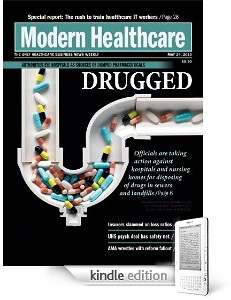The July 19th edition of Modern Healthcare had a very revealing article by Melanie Evans entitled “Don’t ask, don’t tell.” The cut line under that title was “A third of physicians in a study don’t feel obligated to report impaired [fellow] docs.” Ms. Evans went on to describe the fact that the word impaired refers to drugs, alcohol or mental illness. The study was from the Journal of the American Medical Association and it queried nearly 1,900 physicians. Having been involved with the management of hospitals for over two decades, the results of this study shocked me. Not because I didn’t believe it was possible; not because I didn’t believe there could be a problem but because it was clearly not my experience. Yes, there were impaired physicians, administrators and staff members, but the programs available to them were comprehensive, thorough and unending.
If the question was posed, “Is there a problem with drugs, alcohol, and mental illness among physicians?,” my answer would have been yes. The same, however, is true of administrators, staff and employees. None of those exposed to an environment that intersects with life and death issues on a daily basis and that requires the incredibly long hours necessary to keep the proverbial “wheels on the bus” is without risk of these problems. Add to that the relative ease of going from one “friend” to another to get the prescription that is needed, and we have created a potential formula for disaster.
The seriousness of the outcomes derived from this series of questions is not something that any of us “in the business” is in any way ignoring. It is real. It definitely could result in injury andor death through medical errors. So, the question becomes one of management, monitoring and self-policing. The airline industry pays very close attention to the impairment of their pilots. Why? Their crashes are typically not between one pilot and one passenger. They are large, emotional events that impact literally thousands of lives.
When will the medical community begin to embrace the same standards as the airline industry? It seems to me that we are currently “on the move toward that objective now,” and as the public and government put more and more pressure on the healthcare industry to be transparent, it will become harder and harder to hide those shadow surgeries that went wrong or those mis-diagnosed cases that could be traced back to impaired professionals.
The Modern Healthcare article ended with the statement that doctors “need more education on programs that evaluate and manage treatment and monitoring for impaired doctors.” I agree . . . in this case, more is better, but how many “Nurse Jackies” (i.e., the hypothetical impaired employees) do we have flying low throughout our facilities as well? The healthcare industry needs to pay attention to all of its impaired at all levels.








